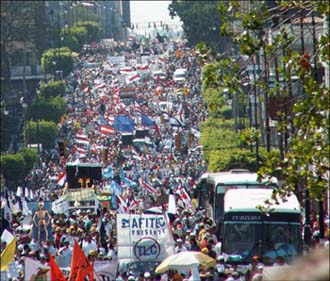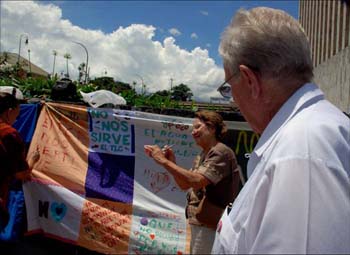By FIRE – Feminist International Radio Endeavour
Radio Internacional Feminista
July 23, 2007
“Banner of Dreams” symbolizes active
participation of
Women Against CAFTA in grassroots resistance movement
By Margaret Thompson & María Suárez Toro
Every day, the colorful
“Banner of Dreams” continues to grow and expand as a powerful
democratic symbol of the growing grassroots resistance movement
against CAFTA – the Central American Free Trade Agreement – in Costa
Rica. Designed and promoted by the group, Women Against CAFTA (Mujeres
Contral el TLC), the “Banner of Dreams,” consists of brightly
colored squares of cloth sewn together as a banner to provide a
means of collecting messages of solidarity from women and men
throughout Costa Rica and the world.
“This banner reflects the
diversity of groups, people and organizations that form the movement
against CAFTA,” noted Paquita Cruz, of Women Against CAFTA. “The
idea is that people send us their banners, some as weavings,
embroideries, paintings, or whatever form they want, and we continue
to add them to the larger banner.”
Women Against CAFTA
representatives have carried and displayed the banner at numerous
venues throughout Costa Rica including conferences, concerts,
rallies and festivals, where people are invited to write or paint
their messages on the cloth. Women have also taken the banner to
collect painted messages of solidarity at the US Social Forum in
Atlanta in June 2007, to Montreal, Canada at the 5th
Continental Meeting of Indigenous Women of the Americas, and to
women’s events in other Central and South American countries.
Denouncing CAFTA in Costa
Rica as a dangerous threat to democracy and the environment, a
growing grassroots resistance movement comprised of a vast diversity
of women, indigenous peoples, labor unions, farmers, political
parties, former Presidents of Costa Rica, teachers, students,
religious groups and small business owners is taking action
throughout the country to stop CAFTA (Central American Free Trade
Agreement), a “free trade” agreement with the United States.
FIRE – Feminist
International Radio Endeavour – has provided extensive coverage of
women’s participation in the struggle, working with Women Against
CAFTA on the Banner of Dreams, as well as launching with other women
a daily radio program entitled, “Women of the ‘NO’”on a local FM
station, and broadcasting through the internet with ongoing
interviews and reports on anti-CAFTA activities.
Opponents of CAFTA say
this treaty would devastate the Costa Rican economy and the
environment, further dismantle a strong social welfare system
through extensive privatization of social services, and contribute
to growing poverty and inequality, all of which hit women
particularly hard. A study in Mexico, for example, showed a 50%
increase in poverty levels among female-heads of households after
NAFTA went into effect, the North American Free Trade Agreement
between Mexico and the United States. (Las Dignas, 2004)
 |

Former Costa Rican
President Rodrigo Carrazo
looks on as his wife, Estella, paints a solidarity message
on the anti-CAFTA banner |
Strong popular resistance to CAFTA forced the Costa Rican government
to schedule a national referendum for October, 2007, although
opponents are worried about the government’s slow response to
establishing voting regulations for the referendum to protect
against fraud. Costa Rica is the only Central American country to
have resisted ratifying CAFTA, with citizens insisting on have
greater input in such sweeping economic, social and political
changes.
In their mission
statement, Women Against CAFTA denounced CAFTA as based on the logic
of neoliberalism, an economic system that imposes the market as the
only operative criterion, with economies globalized in a way that
contribute to inequality between economically powerful and less
powerful countries, and that gives overwhelming advantage to
transnational businesses and their economic power. The group also
noted that newspapers, radio and television reports have said that
privatization would be intensified under CAFTA, which means that
women will be forced at a faster rate to cover the health and
education needs of their children and families, and assume care for
the elderly as the social welfare state would be dismantled in favor
of private interests and people would need to pay for those services
which are actually basic human rights.
Earlier this year, former
Nobel Peace Prize Winner Oscar Arias and a strong advocate of CAFTA
barely won re-election to a second term as President of the
Republic, with a small percentage of votes over the anti-CAFTA
candidate after a recount and massive mobilization against the
election results. Ironically, Arias continues to launch
declarations of peace from his presidential podium, calling on the
United Nations to eliminate weapons while at the same time signing
new laws that would foster production of arms and guns in the
country. If approved, the CAFTA treaty would also allow tax-free
and duty-free import of weapons and arms into Costa Rica, a country
with no army.
Opponents including Women
Against CAFTA have hit the streets with door-to-door campaigns, and
organized concerts and rallies at numerous public activities and
festivals, urging people to vote “NO” on the referendum.
On the other side, with
strong support from the US Embassy, the Arias Administration, large
transnational corporate interests and most mainstream press have
dismissed the opposition movement as comprised of people who resist
globalized modernization and development. Proponents of CAFTA
have launched multi-million dollar advertising campaigns urging
people to vote “Yes” on the referendum in October, declaring that by
not ratifying the treaty, Costa Rica risks being isolated and
blocked from international economic development. However,
CAFTA opponents note a recent economic report that
showed that Costa Rica had the largest increase of exports (17%)
between 2005 and 2006 of any
country in Central America, without having ratified the treaty.
All other countries in the region have signed on to CAFTA.
|
What
can YOU do to provide international solidarity against CAFTA?
1. For those in the USA,
call your Congressional Representatives and tell him/her to
join efforts in Congress to rework CAFTA and other poorly
negotiated free trade deals. Also ask them to oppose
renewal of Fast Track trade-promotion authority for the
President, which expired June 30, 2007. This allows
the President to push through trade deals with no amendments
from Congress. (Call 202-224-3121 or go to:
www.congress.org
to send an e-mail).
2. For those in Asia,
Africa, Europe or Latin America, organize a protest at the
Costa Rican Embassy or Consulate in your area. Please
let Women Against CAFTA know about your activity by sending
an email to
oficina@radiofeminista.net (and put Women Against CAFTA
in the subject line).
3. Send a message
supporting the social movements to the Costa Rican Embassy
or Consulate in your country. You can find a list of Costa
Rica's consulates at:
|
You may use FIRE information, audio files, and photos and give
credit to FIRE (www.radiofeminista.net)
Sources:
Las Dignas (Associación
de las Mujeres por la Dignidad y la Vida -- Association of
Women for Dignity and Life) (2004, March), “Women say NO to
CAFTA,” (published online by International Gender & Trade Network
at:
http://www.coc.org/pdfs/coc/IGTN/Women%20Say%20No%20to%20CAFTA.pdf.)
Augusto Sención,
César (2007) "Disputes in Costa Rica about the Free Trade Agreement (CAFTA) with
the United States," InterAmerican Platform of Democratic Human
Rights and Development (in Spanish at:
http://www.pidhdd.org/rubrique.php3?id_rubrique=37).
FIRE at
www.radiofeminista.net (numerous written
reports and audio interviews by FIRE staff)
|